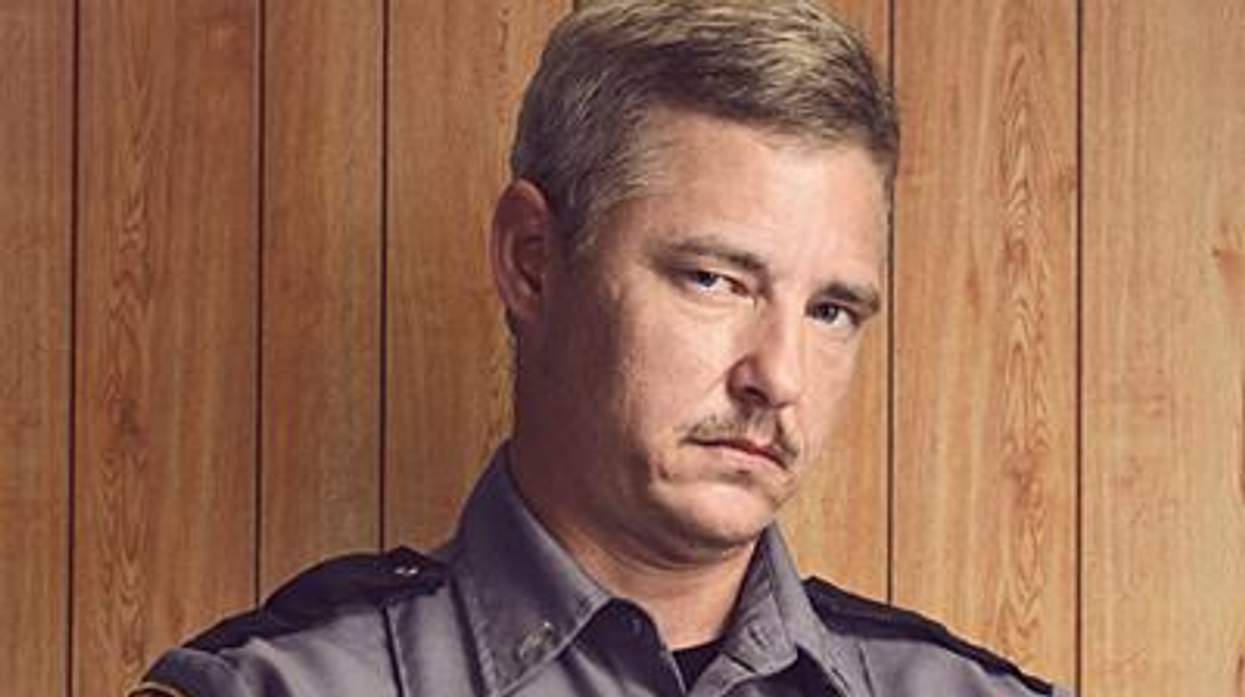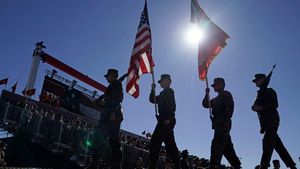After a slew of hit dramas including Mad Men, Breaking Bad, and The Killing, AMC has struck gold of a different kind with its oddly alluring new unscripted series, Small Town Security. The show, which premiered Sunday, centers around quirky and outspoken Joan Koplan (the "Chief") and her small, family-owned private security company located in rural Georgia. Koplan's right-hand man is Lt. Dennis Croft, a fascinating man with a military background determined to turn JJK -- a small-town, family-run security and private investigation agency -- into an elite force.
Croft, we learn halfway through the episode, is transgender, but just as Koplan is compelling, he's so fascinating that the fact he once inhabited a female body isn't nearly the most interesting thing about him. We caught up with Croft to ask some questions about his boss, his calling, and what life is like for a trans man in rural Georgia.
The Advocate: You seem really fond of Joan, your boss. Is she a bit of a mother figure for you? I mean, when you say she should be famous, you sound so adoring and loving.
Dennis Croft: Beyond fond ... yes.
How did your relationship develop with Joan and the folks at JJK Security?
I took the job at a lesser wage than I was used to because I had to know Chief. Everybody else is secondary. My job is to take care of JJK employees, but that is done in order to take care of Chief.
My husband is transgender. He came out and transitioned after we'd been together for 16 years, so I always feel for trans folks who lose their spouses in transition. Can you tell me more about your ex-husband and the divorce? I think viewers want to know why, what happened, why couldn't it survive transition?
I did not lose my spouse because of my transition. I lost because I would no longer just follow. They wanted to rule and be directive in my life the way they saw it even though it was wrong for me. I did have identity issues for years, but my transition began much later, by eight years after the divorce.
You have kids, right? Did your divorce affect your custody or relationship with your child?
Yes, three boys. I don't have any custody.
One of the things that really touched me is that Irwin, Joan's husband, says that you're like an old-fashioned civil servant in your dedication. Is this job more of a calling, a lifestyle, than just a job?
Duty is what I am, the core. My only choice is who I serve. ... I only serve who deserves me to serve them.
In episode 1, we didn't see much of your own family life. Are Joan and Irwin your surrogate family?
Yes.
Will we see more of your other relationships on-screen this season?
Maybe.
Do you feel exposed doing this show? You're, after all, a trans man living in a small town in Georgia, not a big urban metro that might be more liberal.
The fact is I am exposed. I am not a victim nor a hero, so it just is me and my story, and I am unafraid.
You had a really interesting backstory about living sort of a survivalist life in the West prior to Y2K. Can you tell me a bit about that experience?
We went off to Wyoming. I was pregnant by three months. We had purchased a 14-foot tepee before we had left and a few rifles along with supplies such as a dried bean assortment, rice, split peas, wheat berries, etc. We stopped in to Kansas to attend a two-week school of primitive living skills. The school was run by John and Geri McPherson. We learned fire making, cordage, bow making, arrow making, brain tan, basket weaving, trapping and spalling (the beginning of flint knapping). We paid for the school by working for them by doing chores such as cooking, washing dishes, cleaning the horse stalls, and watering horses and feeding them.
We continued to Wyoming, met up with Grant, and then proceeded to our land claim from the Bureau of Land Management. We obtained a homesteading plot. We found our plot and then hauled in on foot our supplies and tepee. It took us eight trips to get it all in. It was three miles from the vehicle trail. Once in we set up. Two weeks later the rangers came to camp and told us to move on. They explained that you can stay on BLM land as long as you want but you had to move at least three miles from your camp location each two weeks. That was too much, not just for the hassle but because they nosed around. We exited and went to Crawford, Neb., located 20 miles south of Pine Ridge.
What's the reception been like for you in your town since you transitioned?
I haven't really felt a change. Those who know me and about me haven't flinched. I found that surprising. t has not been what I expected of others, and I see that folks are not the typical haters of my kind that I thought. The South has grown up from the childish games of prejudice.
What do you hope people will take away from watching this show?
Be unafraid of who you are. Do not let yourself nor anyone tell you what you should be or how to live your life. Reach deep into yourself and see who you are and live that. That is your truth, and it is the truth to all.
For video clips from the premiere, cast bios, and schedule visit AMC's Small Town Security site.





































































Charlie Kirk DID say stoning gay people was the 'perfect law' — and these other heinous quotes